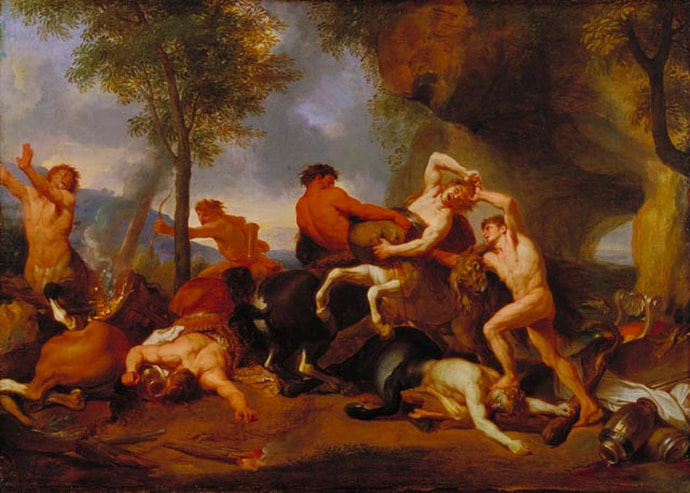THE CENTAUR PHOLUS IN GREEK MYTHOLOGY
Pholus was the name given to a centaur within the tales of Greek mythology. Generally speaking, centaurs were considered to be savages, but amongst their number were named two civilised individuals, Chiron and Pholus.
pHOLUS SON OF sILENUS
|
The race of centaurs, the half-men-half horse creatures of Greek mythology, were named to be descendants of Ixion, born to the cloud Nephele, when Ixion mistook her for Hera.
The descendants of Ixion though were considered to be savages, for it was these centaurs who tried to abduct Hippodamia during her wedding ceremony with his Pirithous. Pholus though was considered to be a civilised centaur, and so was given different parentage by the ancient writers; thus, Pholus was named as a son of Silenus, the rustic god of winemaking, and the nymph Melia. Pholus PLays Host to HeraclesUnlike Chiron, the other civilised centaur, Pholus is famous purely for a single encounter with a Greek hero, Heracles.
Pholus was said to reside upon Mount Pholoe, a mountain which took its name from its resident centaur. Heracles would come to Mount Pholoe as he sought the Erymanthian Boar for one of his labours. Pholus, being the civilised centaur, welcomed Heracles to his cave, and cooked a meat based meal for the hero, although, perhaps in a nod to savagery, it was still said that Pholus consumed his meat raw. As he ate, Heracles called upon his host to open a jar of wine. Pholus had in his possession a jar of wine crafted by Dionysus, for Pholus’ father Silenus was part of the retinue of Dionysus, and being the good host, Pholus opened this jar of wine. |
|
The Attack of the Centaurs
The quality of the wine could not be questioned by Heracles, but the aroma of the wine drifted out of Pholus’ cave, attracting all of the other wilder centaurs.
These centaurs tried to force their way into the cave of Pholus, but in front of them, barring the way stood Heracles, and taking up his weapons, Heracles drove the centaurs back. Heracles then took up his bow, and soon arrow after arrow was finding its marking, killing many centaurs.
Those centaurs that were untouched by the arrows fled, with Heracles in pursuit, with Heracles potentially pursuing them all the way to Mount Pelion.
These centaurs tried to force their way into the cave of Pholus, but in front of them, barring the way stood Heracles, and taking up his weapons, Heracles drove the centaurs back. Heracles then took up his bow, and soon arrow after arrow was finding its marking, killing many centaurs.
Those centaurs that were untouched by the arrows fled, with Heracles in pursuit, with Heracles potentially pursuing them all the way to Mount Pelion.
The Death of Pholus
Pholus would emerge from his cave to see many centaurs lying dead about him, and as was his civilised nature, Pholus decided to bury them. As he did so, Pholus would examine one of the arrows that had killed them, but as he did so, Pholus dropped the projectile, whereupon it fell tip first onto his foot, and so the blood of the Lernaean Hydra entered his body, killing Pholus.
Subsequently, Heracles would return to Mount Pholoe, and there discovered the body of Pholus. To honour the centaur who had welcomed him as a guest, Heracles gave the centaur a celebrated funeral, and buried Pholus at the foot of the mountain that bore his name.
Some tell of how the likeness of Pholus was placed in the stars as the constellation Centaurus, whilst the wine cup of Pholus would become the constellation Crater; although both constellations also have alternative creation tales in Greek mythology.
Subsequently, Heracles would return to Mount Pholoe, and there discovered the body of Pholus. To honour the centaur who had welcomed him as a guest, Heracles gave the centaur a celebrated funeral, and buried Pholus at the foot of the mountain that bore his name.
Some tell of how the likeness of Pholus was placed in the stars as the constellation Centaurus, whilst the wine cup of Pholus would become the constellation Crater; although both constellations also have alternative creation tales in Greek mythology.
|
|
